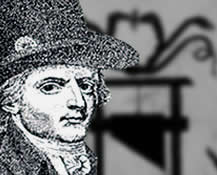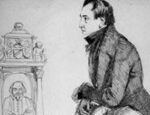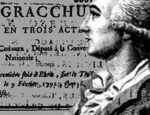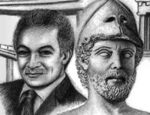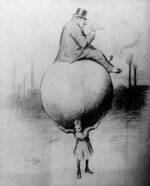Description
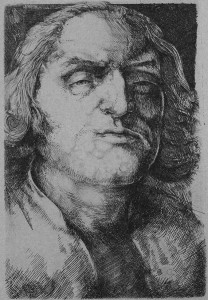 Meet François-Noël Babeuf, one of the founding fathers of communism, who lived up to his pseudonym “Gracchus Babeuf” by attempting to lead the French proletariat in an uprising against the bourgeois regime of the Directory. The ‘Conspiracy of Equals’, as it became known, was discovered by the authorities in May 1796. At the end of May in the following year its leaders, including Babeuf, were executed.
Meet François-Noël Babeuf, one of the founding fathers of communism, who lived up to his pseudonym “Gracchus Babeuf” by attempting to lead the French proletariat in an uprising against the bourgeois regime of the Directory. The ‘Conspiracy of Equals’, as it became known, was discovered by the authorities in May 1796. At the end of May in the following year its leaders, including Babeuf, were executed.
Babeuf was brought up in extreme poverty. His father, who deserted from the French Royal Army in 1738 to fight instead for Maria Theresa (reputedly at the rank of major), returned to France in 1755 a penniless casual labourer. Following a basic education at his father’s knee, François-Noël went out to work as a domestic servant. In 1785, five years after his father’s death, he gained more lucrative employment as Commissaire à Terrier, assisting the landed gentry and clergymen in the assertion of their feudal rights over the peasants. He was unsurprisingly fired from this post when he published his first revolutionary article which argued for the abolition of feudal tenures, and a single tax to be levied irrespective of class. He would later campaign for taxation according to one’s means.
In the summer of 1789 he left his native Roye for Paris, just in time for the famous storming of the Bastille. Babeuf was a conflicted observer of the bloody Revolution. The punishments inflicted on the aristocracy were, in his eyes, simultaneously cruel and just. The aristocrats, whose heads were being paraded on pikes, were certainly reaping what they had for so long sown, but to what end, and at what cost? His experiences in high-revolutionary Paris convinced him that the ways of the old world were over for good, and so too, therefore, was his way of living (as land registry officer): “I am myself disposed, all the same, to put my shoulder to the wheel, to bring about that which would destroy my livelihood. Egoists would call me mad, but no matter!”
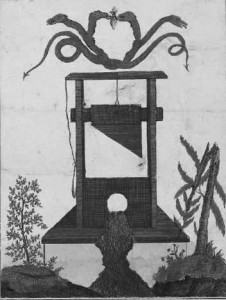 A yet again destitute Babeuf became a firebrand political journalist, whose writings were laden with those classical allusions and Roman historical examples that so strongly characterize the revolutionary writing of that period. One such allusion was made in response to the accusation by an aristocrat of his being a feudalist turncoat and a hypocrite—a just accusation, it might be said, considering Babeuf’s former occupation. He retorted with no little rhetorical relish that in his youth he had indeed stood in awe of his “mother, the feudal system”, but since he had become a man, and since “the sun of the Revolution” had enlightened him, he perceived that this mother was a “hydra with a hundred heads.” This hydra was the embodiment of evil and the united vested interests of the ancien régime, but it was also based in and evocative of Hercules’ vanquished victim, the Lernaean Hydra of his second labour.
A yet again destitute Babeuf became a firebrand political journalist, whose writings were laden with those classical allusions and Roman historical examples that so strongly characterize the revolutionary writing of that period. One such allusion was made in response to the accusation by an aristocrat of his being a feudalist turncoat and a hypocrite—a just accusation, it might be said, considering Babeuf’s former occupation. He retorted with no little rhetorical relish that in his youth he had indeed stood in awe of his “mother, the feudal system”, but since he had become a man, and since “the sun of the Revolution” had enlightened him, he perceived that this mother was a “hydra with a hundred heads.” This hydra was the embodiment of evil and the united vested interests of the ancien régime, but it was also based in and evocative of Hercules’ vanquished victim, the Lernaean Hydra of his second labour.
After numerous legal suits and a spell in prison, Babeuf started up in 1794 a socialist journal called ‘The Tribune of the People’ and assumed the provocative but somewhat ill-omened name of Gaius Gracchus, the reformist tribune and political martyr, murdered by the Senate in 121 BCE.
Although he was executed in 1797, the socialist and broadly ‘anarchistic’ spirit of Gracchus Babeuf’s life and journalistic output would continue to influence international socio-political debate for over a century. The British Utopian Socialist, John Goodwyn Barmby—who introduced Friedrich Engels, co-author of the Communist Manifesto (1848) to the French communiste movement—is thought to have coined the English term ‘communist’ while meeting with followers of ‘Gracchus Babeuf’ in 1840.

